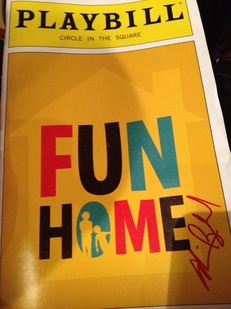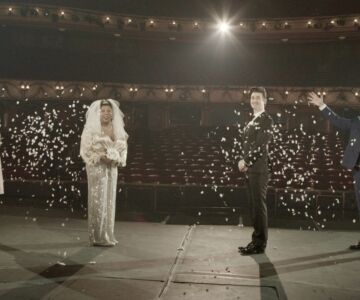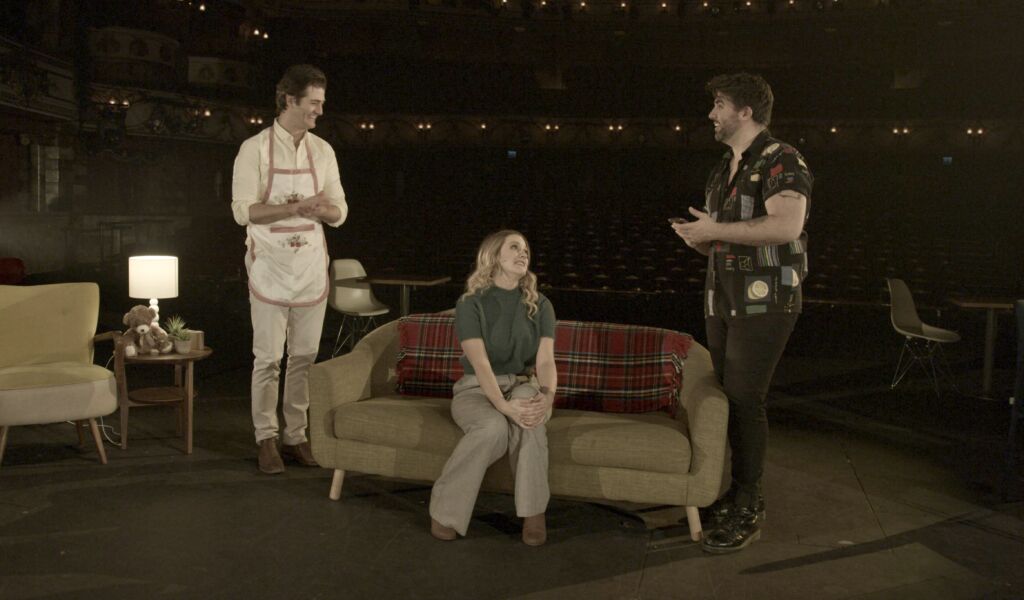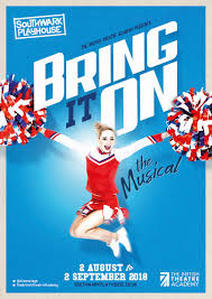 Austin Withdrawal Is Rough, Y'all, So I Made 'Burritos'by Randi / June 9, 2015
Austin Withdrawal Is Rough, Y'all, So I Made 'Burritos'by Randi / June 9, 2015 My Playbill signed by Alison Bechdel herself, who was in my audience. Or, I was in her audience.
My Playbill signed by Alison Bechdel herself, who was in my audience. Or, I was in her audience.
“Fun Home” is the kind of musical theatre that makes you grateful for the art form. Rarely are we treated to any art or entertainment that doesn’t cater to the lowest common denominator in our society or at least dumb itself down to appeal to the ignint masses. “Fun Home”, in contrast, treats its audience like intelligent, thinking people, and we are gifted the most heart-aching, mature, and deep show in years.
People think “Broadway Musical” should mean something diverting, with fun and dancing and repetitive, catchy songs about trivial happy things. And some shows are and should be like that. But modern shows need to challenge the genre and the audience in new ways to keep it growing and improving. New scores should develop emotions in ways words can’t; that’s kind of the point of having music in a play or like in the world, to express what words can’t. “Next to Normal” did all this and was revolutionary and boundary-pushing, but that was 6 or so years ago; nothing since has been up to the challenge.
Until now. “Fun Home” picks up that gauntlet thrown by “Next to Normal” and runs farther than ever. I think “Fun Home” will catch on and become more popular, and will continue to break barriers in this kind of storytelling. It seems like a really unlikely musical, given its subject matter, but it geniusly uses music to deepen its storytelling rather than embellish. The result is far more important and remarkable than anyone would have predicted.
“Fun Home” is based on the graphic novel of the same name by Alison Bechdel. If that name sounds familiar, it’s probably because you’ve heard of the Bechdel Test for movies: when two female characters are in a scene together and talk about something other than a man, it passes. (Movies rarely pass this test.) So Bechdel is professionally a very noteworthy modern voice. Her personal story, on the other hand, is the basis for the novel and the show; Tony winner Lisa Kron wrote the show’s book based tightly on its source material. It chronicles Alison’s upbringing in a small country town of Pennsylvania, from when she’s a little kid discovering herself and her sexuality; to when she’s a college student accepting who she is while learning more about her disciplined and particular father; to the modern-day adult looking back on her relationship with her father. Bruce Bechdel, a very rigid and exacting man, hid his own homosexuality his entire life. The story is told from grown-up Alison’s perspective as she looks back on her childhood and tries to come to grips with her father’s suicide (not a spoiler, real person, point of show). So, yeah, not the most expected story for a Broadway musical, but it works so well that you’ll be questioning your assumptions about everything, not just musical theatre.
Grown-up Alison (played by a superb Beth Malone (Tony nominee)) takes us on a tour through her memories of her younger years, as she tries to accurately recall the memories to draw, as her comics were what helped her deal with her complicated relationship with her father. As she revisits her childhood museum-like home, the funeral home her family ran (hence the title, what they referred to it as, the ‘fun home’), and different moments with her family, we watch with her as she witnesses her childhood memories being lived by the younger versions of herself (Sydney Lucas as Young Alison, an absolute legend in the making, and Emily Skeggs as Middle Alison (both Tony nominees)). She laughs along with us as she sees her little self and her little brothers stage a hilarious musical commercial for the fun home. Watching little kids pop out of caskets and dance on them is shocking and hilarious and the happiest time of the heavy show. She smiles along with us at the most poignant moments in her life, like when her younger self, always yearning for contact with her father, goes ‘flying’, balancing on Bruce’s feet as he lies down with his legs up, a happy memory of the best of their relationship that remains untarnished. Just thinking about that moment makes me cry.
Young Alison’s relationship with her father is the crux of this story, and it’s a wonder. You clearly see that they have a bond but one that is easily strained, especially when she pushes his rigid lines and rules. She doesn’t want to wear barrettes or dresses, but he can’t allow the blurring of gender boundaries, an obvious result of his hidden side and the shame he feels at not being what he feels he’s supposed to be. Their beautiful house is decorated perfectly with antiques and museum-worthy furniture that he dictates be positioned exactly as he says. He controls fastidiously anything he can because he can’t control himself or his urges as he believes he should. And you see all this so well in the subtle and poignant portrayal of Bruce by Michael Cerveris, the great. His Tony win was completely deserved; his portrayal is beautiful and crushing and I was rooting for him even though he’s a past winner (I am usually socialist in my awards decisions but not for him). His nuanced Bruce makes you feel terrible for his tragic persona even when his inability to control his urges leads him to make terrible decisions, like leaving his little kids alone in a NYC apartment so he can go cruising, or having flings with his underage high school students. It’s this loving but lacking relationship with his young daughter that makes it so hard to watch as it strains further, as she grows and becomes more self aware as a college student. Middle Alison accepts and embraces her personality and her sexuality as a young lesbian, and with this evolution her relationship with her father weakens, because he can never accept himself as his daughter has learned to do. Her coming out is barely acknowledged by her family, not out of disrespect or denial but because it would shatter the very fragile world her parents strived to keep balanced. And yes, her mother (Judy Kuhn) was aware and struggled her whole life to keep quiet and pretend that everything was fine.
Bruce and Alison’s final encounter is so perfectly and tragically portrayed as a silent car ride, with Alison, the grown-up who never got to spend time with her father, taking over the memory from Middle Alison. Beth Malone tearfully sings to her former self to say something to her father before the chance is gone, yelling to hurry up before the ride is over, as she knows in hindsight that it soon will be.
This story would work as a play, sure, but the music makes it so much more felt and heart-breaking. One of the best songs, “Ring of Keys”, is a startled realization that little Alison can dress however she wants, when she sees “an old-school butch”, as her older self remembers and explains (and as CBS/the FCC f-ing had them change on their Tony Awards performance because I guess some Americans aren’t okay with the word butch???!!!). Sydney’s performance of this song is so thoughtful and natural and incredible that it’s hard to believe she’s a child. No child actor has ever been this talented in history. It’s why she was considered the front-runner for the Tony Awards. Her fiercest competition was thought to be not from winner Ruthie Ann Miles (for “The King & I”) but from the actress who plays her mother, the great Judy Kuhn. Quiet, clearly long-suffering, she surprises us when she tells her college aged daughter about her father’s secret and that she’s known for, well, for “Days & Days & Days”, as her astounding, stunning big song goes. She freaking kills it, sharing how hard it has been to silently let her husband dictate and destroy their lives and how she sat by and watched for so long as nothing changed. In just one song, Kuhn defines and redefines her entire character’s story and adds new layers of wrenching emotion to the show as a whole. It must be such a pleasure to play a complex character for once (Kuhn originated the thankless role of Cosette in the original Broadway production of “Les Miserables”).
“Fun Home” is a flawless show that in only 100 minutes presents such depth and range of emotion and experience and it is all completely spell-binding. That it won the Tony Award shows that audiences and musical theatre as a genre are both ready to be treated with respect and given art that is worthy of being called art. (Of course, last night’s premature closure of “The Visit” argues in the opposite direction but we can’t win every battle.) I hope everyone sees it, learns from it, and remembers it as a benchmark for future shows. This is the direction Broadway needs to move in, and it’s a relief that people seem to accept that.
“Fun Home” is based on the graphic novel of the same name by Alison Bechdel. If that name sounds familiar, it’s probably because you’ve heard of the Bechdel Test for movies: when two female characters are in a scene together and talk about something other than a man, it passes. (Movies rarely pass this test.) So Bechdel is professionally a very noteworthy modern voice. Her personal story, on the other hand, is the basis for the novel and the show; Tony winner Lisa Kron wrote the show’s book based tightly on its source material. It chronicles Alison’s upbringing in a small country town of Pennsylvania, from when she’s a little kid discovering herself and her sexuality; to when she’s a college student accepting who she is while learning more about her disciplined and particular father; to the modern-day adult looking back on her relationship with her father. Bruce Bechdel, a very rigid and exacting man, hid his own homosexuality his entire life. The story is told from grown-up Alison’s perspective as she looks back on her childhood and tries to come to grips with her father’s suicide (not a spoiler, real person, point of show). So, yeah, not the most expected story for a Broadway musical, but it works so well that you’ll be questioning your assumptions about everything, not just musical theatre.
Grown-up Alison (played by a superb Beth Malone (Tony nominee)) takes us on a tour through her memories of her younger years, as she tries to accurately recall the memories to draw, as her comics were what helped her deal with her complicated relationship with her father. As she revisits her childhood museum-like home, the funeral home her family ran (hence the title, what they referred to it as, the ‘fun home’), and different moments with her family, we watch with her as she witnesses her childhood memories being lived by the younger versions of herself (Sydney Lucas as Young Alison, an absolute legend in the making, and Emily Skeggs as Middle Alison (both Tony nominees)). She laughs along with us as she sees her little self and her little brothers stage a hilarious musical commercial for the fun home. Watching little kids pop out of caskets and dance on them is shocking and hilarious and the happiest time of the heavy show. She smiles along with us at the most poignant moments in her life, like when her younger self, always yearning for contact with her father, goes ‘flying’, balancing on Bruce’s feet as he lies down with his legs up, a happy memory of the best of their relationship that remains untarnished. Just thinking about that moment makes me cry.
Young Alison’s relationship with her father is the crux of this story, and it’s a wonder. You clearly see that they have a bond but one that is easily strained, especially when she pushes his rigid lines and rules. She doesn’t want to wear barrettes or dresses, but he can’t allow the blurring of gender boundaries, an obvious result of his hidden side and the shame he feels at not being what he feels he’s supposed to be. Their beautiful house is decorated perfectly with antiques and museum-worthy furniture that he dictates be positioned exactly as he says. He controls fastidiously anything he can because he can’t control himself or his urges as he believes he should. And you see all this so well in the subtle and poignant portrayal of Bruce by Michael Cerveris, the great. His Tony win was completely deserved; his portrayal is beautiful and crushing and I was rooting for him even though he’s a past winner (I am usually socialist in my awards decisions but not for him). His nuanced Bruce makes you feel terrible for his tragic persona even when his inability to control his urges leads him to make terrible decisions, like leaving his little kids alone in a NYC apartment so he can go cruising, or having flings with his underage high school students. It’s this loving but lacking relationship with his young daughter that makes it so hard to watch as it strains further, as she grows and becomes more self aware as a college student. Middle Alison accepts and embraces her personality and her sexuality as a young lesbian, and with this evolution her relationship with her father weakens, because he can never accept himself as his daughter has learned to do. Her coming out is barely acknowledged by her family, not out of disrespect or denial but because it would shatter the very fragile world her parents strived to keep balanced. And yes, her mother (Judy Kuhn) was aware and struggled her whole life to keep quiet and pretend that everything was fine.
Bruce and Alison’s final encounter is so perfectly and tragically portrayed as a silent car ride, with Alison, the grown-up who never got to spend time with her father, taking over the memory from Middle Alison. Beth Malone tearfully sings to her former self to say something to her father before the chance is gone, yelling to hurry up before the ride is over, as she knows in hindsight that it soon will be.
This story would work as a play, sure, but the music makes it so much more felt and heart-breaking. One of the best songs, “Ring of Keys”, is a startled realization that little Alison can dress however she wants, when she sees “an old-school butch”, as her older self remembers and explains (and as CBS/the FCC f-ing had them change on their Tony Awards performance because I guess some Americans aren’t okay with the word butch???!!!). Sydney’s performance of this song is so thoughtful and natural and incredible that it’s hard to believe she’s a child. No child actor has ever been this talented in history. It’s why she was considered the front-runner for the Tony Awards. Her fiercest competition was thought to be not from winner Ruthie Ann Miles (for “The King & I”) but from the actress who plays her mother, the great Judy Kuhn. Quiet, clearly long-suffering, she surprises us when she tells her college aged daughter about her father’s secret and that she’s known for, well, for “Days & Days & Days”, as her astounding, stunning big song goes. She freaking kills it, sharing how hard it has been to silently let her husband dictate and destroy their lives and how she sat by and watched for so long as nothing changed. In just one song, Kuhn defines and redefines her entire character’s story and adds new layers of wrenching emotion to the show as a whole. It must be such a pleasure to play a complex character for once (Kuhn originated the thankless role of Cosette in the original Broadway production of “Les Miserables”).
“Fun Home” is a flawless show that in only 100 minutes presents such depth and range of emotion and experience and it is all completely spell-binding. That it won the Tony Award shows that audiences and musical theatre as a genre are both ready to be treated with respect and given art that is worthy of being called art. (Of course, last night’s premature closure of “The Visit” argues in the opposite direction but we can’t win every battle.) I hope everyone sees it, learns from it, and remembers it as a benchmark for future shows. This is the direction Broadway needs to move in, and it’s a relief that people seem to accept that.






